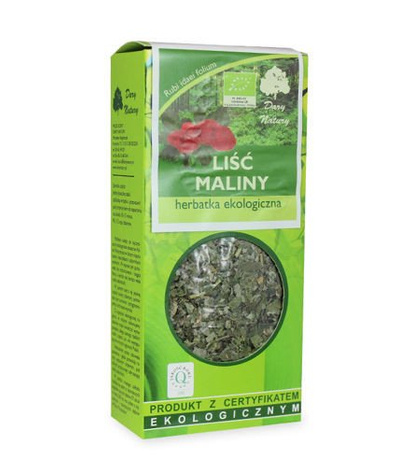RASPBERRIES LEAF BIO TEA 25g from "NATURE GIFTS"
- Raspberry leaf herb can be used as a means of cleansing the body of toxins, regulates metabolism and assist in the excretion of waste products.
RASPBERRIES LEAF BIO TEA 25g from "NATURE GIFTS"
In folk medicine raspberry was also considered to improve digestion, with anemia, stomach pains and sclerosis, a decoction of the fruit with honey was treated even measles. In some countries, a decoction of the leaves was administered at dysmenorrhea, and Tibetan medicine both decoction and infusion of liści- with neurasthenia, neuroses, acute and chronic infections. Externally a decoction from the dried leaves raspberries were used to compresses and wraps, and fresh crushed leaves were part of on skin diseases. The infusion of the shoots of winter was anti-cough, with the young shoots cut - napotnym, and the infusion of kwiatów- antipyretic (D. Tyszyńska- Kownacka et al.).
Chemical composition:
The leaves are flavonoids, tannins, organic acids (citric acid, lactic acid, ascorbic acid) resin and mineral salts and vitamin C, provitamin A. Leafless tops young shoots contain a lot of salicin
Action:
Leaves raspberries astringent, antibacterial and anti-inflammatory. Water extracts containing tannins, inhibit the growth of intestinal bacteria and reduce diarrhea. It also causes a slight relaxation of intestinal smooth muscle, blood vessels and the uterus.
Application:
The infusion of dried fruit raspberries, raspberry syrup and have long been known and frequently used drug napotnym in bacterial and viral diseases with increased temperatures. Dried fruits are part of herbal mixtures. Raspberry syrup shall be especially children.
Preparations of raspberry leaf is used as an astringent poorly in gastritis and enteritis and gently running diarrhea, especially in children, and also in dimly severe flatulence. Better results are achieved in combination with other raw materials having a similar effect. Externally used for rinsing the mouth and throat.
Fruits and leaves are used to treat the so-called. przeziębieniowych, running with elevated body temperature - flu, tonsillitis; both orally and topically to rinse the mouth and throat; also prolonged diarrhea, and also to wash oily skin with acne, the wounds and burns, ulcers.
In Tibetan folk medicine infusion and decoction of the leaves are the means used for neurasthenia, neuroses, acute and chronic infections.
How to use:
Take one teaspoon, pour a cup of boiling water and leave covered to infuse for about 10-15 minutes. Drink 1-2 times a day.
